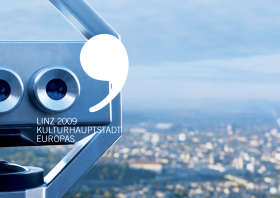LINZ 2009 – EUROPEAN CAPITAL OF CULTURE
General Press Information
Linz – Host City to Europe2009 is an annus mirabilis for Linz. In this year the capital of Upper Austria is the European Capital of Culture, together with Vilnius, the capital of Lithuania. With a wide array of events, much creative input into the artistic programme and the cooperation of open-minded, 2009 is a showcase of European diversity and offer a wonderful opportunity to let that diversity make a major impact.
A City of Possibilities
Linz: 190.000 inhabitants; the hub of an economically thriving region with a population of over half a million; set amidst a lovely landscape on the banks of the Danube an hour and a half from Vienna. But Linz is much more than that. It is a city whose recent history is made up of chapters as diverse as the dark times of National Socialism and the unparalleled upswing of the last 20 years. It is also a city with a present, one that is unmistakably stamped by its vitality and selfconfidence. And, finally, it is also a city in which the future is taken seriously – in the planning that’s done and the action that follows. And it’s for this very reason that the Capital of Culture year isn’t just pyrotechnics but a milestone on the road to the future.
Culture – a Genuine Part of People’s Lives
In Linz, music, theatre, visual arts, film and the innovative ideas of a thriving underground scene are soaked up by audiences that are highly receptive to contemporary modes of cultural expression. At the Ars Electronica Festival and the Museum of the Future, in the Lentos Museum of Art, the Brucknerhaus, the Landestheater, the OK Center for Contemporary Art and the Landesgalerie, at the Festival of the Regions and the Crossing Europe film festival – there are many venues dedicated to culture in Linz. But culture is also played out on the city’s streets and squares, in its green spaces, and up and down the river that runs through it.
The People behind Linz 2009
A European Capital of Culture involves the heads, hands and hearts of a wide variety of men and women. And people’s readiness to get involved has been a joy to behold. Martin Heller is artistic director of Linz 2009 and ultimately responsible for the programme and its impact. This choice of someone from outside was a deliberate one: Heller is a Swiss citizen with extensive international experience implementing major projects of this kind.
Conception of programme 2009
The title Europe’s capitals of culture is more a grant to aid the development process up to the year in question than an award to acknowledge the current state of the city. Linz and Upper Austria therefore had to come to a range of political decisions to set out a clear framework of conditions for 2009. This involves massive investment in the construction of cultural institutions as well as considerable expenditure on developing the overall programme.
In terms of themes, the cultural capital programme is to be kept as open as possible. Architecture, fine arts, education and science, performing arts, design, Europe, film and cinema, gender, history, society and politics, industry and work, infrastructure, youth, children, communication, culinary art of dining, literature, media, music, public space, nature and ecology, region, religions, social topics and migration, sports, districts, tourism, Vilnius, folk culture and economy are all key words for classification.
Funding partners and sponsors






